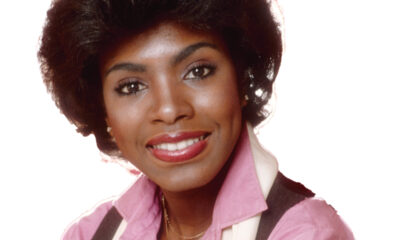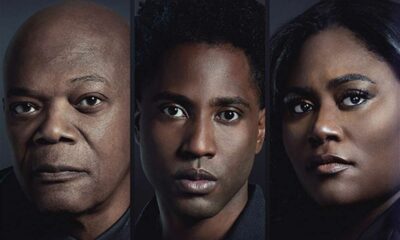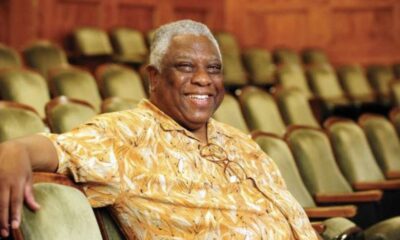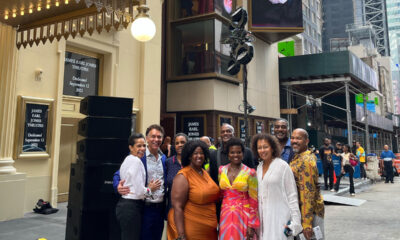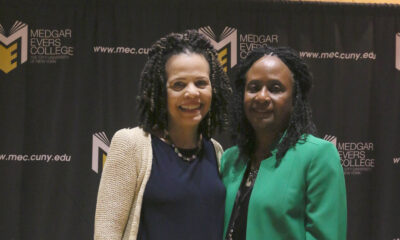Top Stories
Culture & Flash
James Earl Jones is Driving Miss Daisy on Broadway
James Earl Jones sat onstage at the New York Times‘ TimesTalks program and told the audience: “I am a journeyman. I walk and pick up roles where I can find them.”
Well, his latest walk has taken him to Driving Miss Daisy. Jones has joined film legend Vanessa Redgrave for a limited revival of the Pulitzer-, Tony- and Oscar- winning story about the relationship between an Atlanta Black chauffeur and a Jewish widow in the Jim Crow South. Audiences watch the two superstars at the Golden Theater verbally spar and physically age onstage over the decades from the 1940’s through the 1960’s.
Jones has easily slid into the role of Hoke, a part made famous on stage and screen by Morgan Freeman. “Both Morgan and I are from Mississippi. We know people like that,” he remarked. “I know Hoke. Hoke is a throwback. He doesn’t have the power of speech and he doesn’t read. He’s a lot more intelligent than his speech would suggest.”
Ironically, speech has always been a problem for the man with the most famous voice in America. “I’m a walking irony,” said Jones. “I am still a stutterer and my main focus is to communicate.”
The son of the late actor Robert Earl Jones (The Sting) grew up with his grandmother and was very shy as a child. Jones said he was almost mute until a teacher inspired him. He said, “If you love words, you have to say it out loud.”
As a student at the University of Michigan, Jones entered theater with his first role-as a horse. By 1957, he made his Broadway debut and within three years Jones began a long affiliation with Joseph Papp’s New York Shakespeare Festival. During the 1960’s, he performed in the park with George C. Scott and later both appeared in the classic film Dr. Strangelove. Both were nominated in 1969 for Oscars in signature roles-Scott for Patton and Jones for the Great White Hope. Scott’s general won.
So far, the Oscar has eluded Jones. Still, his work has earned a treasure trove of other awards: two Tonys, four Emmys, a Golden Globe, two Obies, five Drama Desks and a Grammy, the National Medal of Arts, the John F. Kennedy Center Honor and the Screen Actors Guild Lifetime Achievement.
Back in the 1970’s, studios even talked with him about starring as the original Shaft. “I’m a country boy,” he laughed. ” I don’t know how to act like a street dude.” Instead, he was offered stalwart types-admirals, generals, judges, kings and even The Man, the 1972 film about the first Black president of the United States.
Audience favorites include: The Lion King, Claudine, The River Niger, The Greatest, A Piece of the Action, Bingo Long and the Traveling All-Stars, Coming to America, The Hunt for Red October, Cry the Beloved Country, Field of Dreams, Star Wars and the list goes on.
Broadway is still his base. Jones onstage is an unforgettably powerful performer. August Wilson had said he wrote Troy, the Tony winning character from Fences, with Jones in mind. “Fences was not just a social message, it was a political message,” said Jones. He saw Denzel Washington’s Tony-winning performance. “He did beautifully with it,” he said. “The audience would like to just eat him up,” Jones laughed.
Jones is turning 80 and is married and has an adult son. He reminisced about creating fatherly bonds with two actors who played his sons on Broadway. The original Fences son (Courtney Vance) “just makes me weep,” he remarked. “The minute I laid eyes on Terrence Howard, I knew he was my son,” he said of his Cat on a Hot Tin Roof co-star.
While performing Cat on a Hot Tin Roof in London, masses of Star Wars fans would line up outside the theater waving posters, helmets and other Star Wars memorabilia hoping to be signed by Jones, the voice of Darth Vader.
Jones knows the power of the voice. “If you fall in love with your own voice,” he said, “no one else will listen to it.”
Tyler Perry’s “For Colored Girls” Takes Ntozake Shange’s Prose to the Big Screen
Over 35 years have passed since Ntozake Shange’s courageous choreopoem For Colored Girls Who Have Considered Suicide When the Rainbow is Enuf burst onto the New York stage. Shange’s poetic, dramatic, stark storytelling about a rainbow of experiences of a group of Black women with romance, family, dance, abortion, music, violence, rape, God and self-love mesmerized audiences. It was taken to stages Off Broadway and on Broadway by theatrical legends producer Joseph Papp, associate producer Woodie King, and director Oz Scott. The production earned Obie Awards and a Tony for actress Trazana Beverley.
In 1982, PBS broadcast a special production of For Colored Girls…directed by Scott and starring Shange, Beverley, Lynn Whitfield and Alfre Woodard, which is available on DVD. For decades, the production has been a staple for young women in regional theaters and college classrooms nationwide. Now it is a major motion picture by Tyler Perry with a cast of top Hollywood actresses.
“It was intimidating work,” Tyler Perry admitted at a packed press conference in New York. “It means so much to many people. Especially women.”
Surrounding Perry was a stellar group: Janet Jackson, Thandie Newton, Phylicia Rashad, Anika Noni Rose, Loretta Devine, Kimberly Elise, Kerry Washington, Macy Gray and newcomer Tessa Thompson. Whoopi Goldberg was a no-show, she is working her day job on The View.
For Colored Girls was filmed this summer in Harlem and at Tyler Perry Studios in Atlanta. Kerry Washington (Ray, Mr. & Mrs. Smith) was starring on Broadway and found herself shooting her social worker role in Harlem during the day and racing to the stage to be in Race at night. When the crew moved to Atlanta, she was amazed to be filming at Tyler’s Sidney Poitier Soundstage and Ruby Dee/Ossie Davis Soundstage. “It showed we can own our stories,” she said: Kimberly Elise (Diary of a Mad Black Woman, John Q) had to let go of her peaceful life of meditation and diet to tackle the difficult life of Crystal. “I began with five gray hairs and finished the production with 50,” she stressed. “Crystal wasn’t connected and she walks through the film disconnected.”
For Janet Jackson (Why Did I Get Married), her recent collaboration with Perry was a different dramatic experience. “Acting has always been a challenge for me,” she explained. She found magazine publisher Jo to be “shrewd, bold, she has a lot of bitch inside her.”
To British actress Thandie Newton (The Pursuit of Happyness, Crash), the poetry was an extension of each character. “Emotion took over for words,” she said. “I went to a completely new place. It worked so perfectly to express the inexpressible.”
The parts were so intense for the actresses that Perry, at times, had to safely sooth them out of their characters.
“He would say ‘come on back up,’” said Elise. “He’s been there as an actor.”
“I know how difficult it is to go that deep,” added Perry. “It was important for them to know they were safe.”
Like actor Forrest Whitaker directing author Terry McMillan’s acclaimed Waiting to Exhale, with an all-Black female cast (which included Loretta Devine), actor-director Perry found himself surrounded by top actresses and retelling a work by a renowned Black woman writer.
“As a man, it is difficult to understand a lot of this,” he explained. “I talked with Ntozake a lot.”
The men of For Colored Girls, actors Michael Ealy (The Good Wife, Takers), Omari Hardwick (The A Team, Miracle at St. Anna), Richard Lawson (How Stella Got Her Grove Back), Hill Harper (CSI: NY) and Khalil Kain (Girlfriends), take the audience on an emotional roller coaster with their relationships.
“The men were just as committed,” said Perry. “They wanted to make sure they were supporting the women.”
Like her character Gilda in For Colored Girls, there’s a serenity about Phylicia Rashad (The Cosby Show). “All women in the world are colored girls,” the Broadway star told the press corps. “When we understand women correctly, society changes.”
Sheree Renee Thomas Recommends True Terror Tales
Halloween might be over but the popularity of terrifying tales of horror, fantasy and science fiction will not die. Sheree Renee Thomas, the acclaimed editor of the award-winning short story tome Dark Matter: A Century of Speculative Fiction from the African Diaspora and Dark Matter: Reading the Bones, is considered a leading literary expert in the genre. Her books have traced the African-American speculative fiction writers from W.E.B. DuBois to L.A. Banks.
“Black readers love to read. Speculative fiction, science fiction, fantasy and horror are genres that when done well, truly challenge readers and spark our imaginations,” she pointed out. “That’s what I’m looking for when I curl up with a book, something that’s going to challenge my default settings and make me think that wonderful question that inspires all stories, “What if…?”
I touched base with Sheree to recommend her favorite top ten Black sci-fi and supernatural writers. Literary legends Octavia E. Butler (Kindred and Wild Seed) and Samuel R. Delany (Dhalgren) led the list. They were followed by Tananarive Due (The Between and My Soul to Keep) and Nalo Hopkinson (Brown Girl in the Ring and Skinfolk). In addition, she enjoys Andrea Hairston (Mindscape), Nnedi Okorafor (The Shadow Speaker and Who Fears Death), N. K. Jemison (The Hundred Thousand Kingdoms) and Steven Barnes (Blood Brothers, Lion’s Blood and Zulu Heart). For vampire mavens she lists Terrence Taylor’s series Bite Marks about New York vamps and Black folks in the 1980’s and Minion by L. A. Banks, described by Sheree as “Sankofa meets Buffy the Vampire and you’ve got a wild ride!”
To Sheree, the current sci-fi boom in books, television, movies and even theater is happening because we are living in an increasingly more sci-fi world. “Who would have thought we’d be reading books from small, portable tablets, or that the Internet would change the way we even use our phones? Our tech is moving so fast it’s all our spirits and minds can do to try to keep up,” she explained. “Pop culture embraces the changes, so here we are watching television shows and programs that attempt to imagine those changes for us.”
Right now, Shotgun Lullabies, a collection of magical and terrifying short stories and poetry penned by Sheree Renee Thomas, is scheduled for release in January 2011. For aspiring sci-fi, fantasy and speculative fiction writers, check out her 2011 Writer’s Workshop at Frederick Douglass Creative Arts Center.



